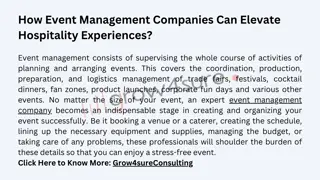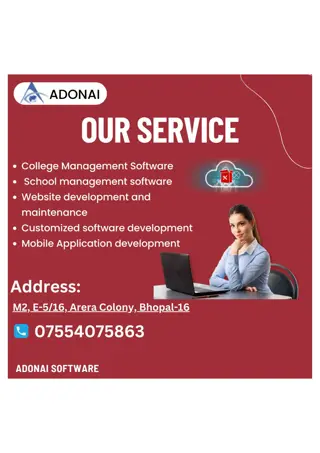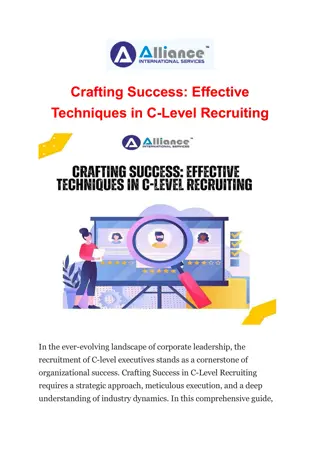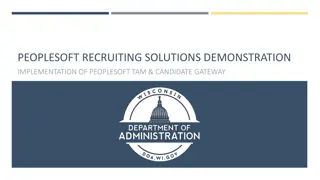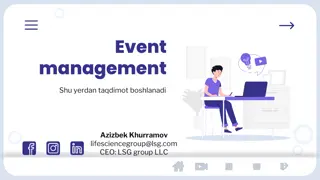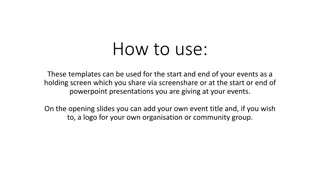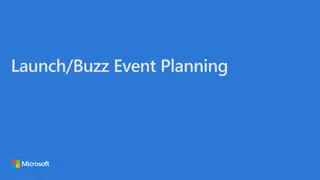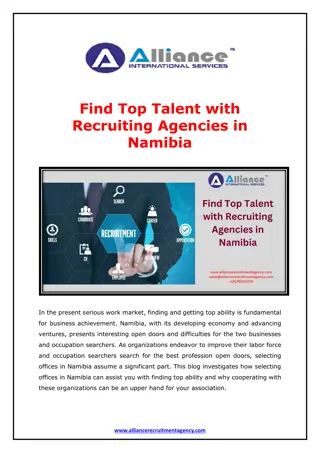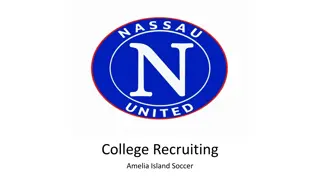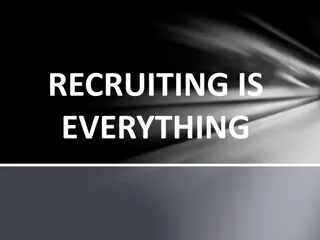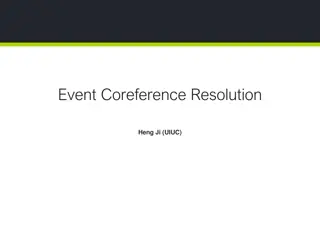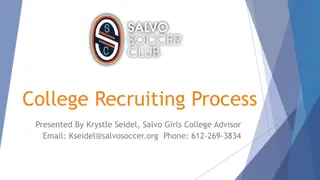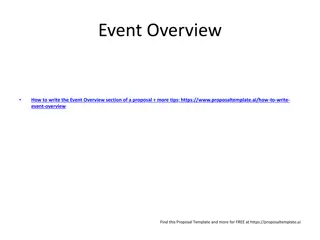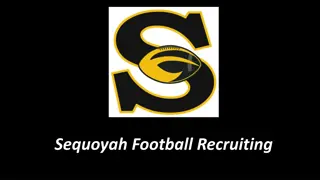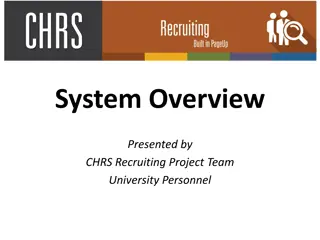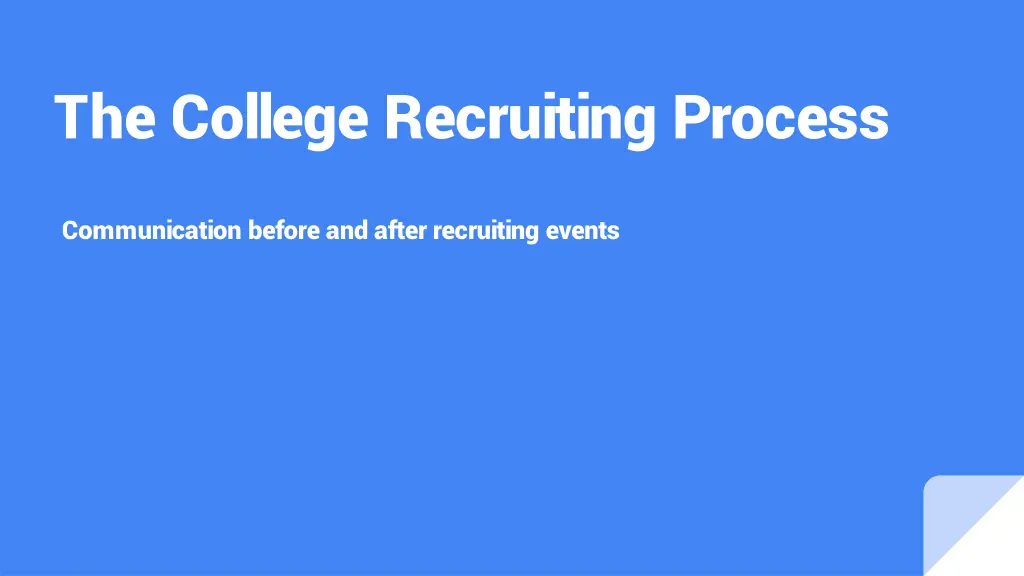
Effective Communication Strategies in College Recruiting Process
Learn the proper methods for contacting college coaches before and after recruiting events, including sending introductory emails, following up with calls, and staying in touch with updates. Crafting a compelling subject line in introductory emails is essential to catch the coach's attention. Discover examples of well-crafted subject lines to increase your chances of getting noticed by college coaches.
Uploaded on | 1 Views
Download Presentation

Please find below an Image/Link to download the presentation.
The content on the website is provided AS IS for your information and personal use only. It may not be sold, licensed, or shared on other websites without obtaining consent from the author. If you encounter any issues during the download, it is possible that the publisher has removed the file from their server.
You are allowed to download the files provided on this website for personal or commercial use, subject to the condition that they are used lawfully. All files are the property of their respective owners.
The content on the website is provided AS IS for your information and personal use only. It may not be sold, licensed, or shared on other websites without obtaining consent from the author.
E N D
Presentation Transcript
The College Recruiting Process Communication before and after recruiting events
Proper Methods For Contacting College Coaches While coaches have their different methods for recruiting and connecting with future prospects, the best way to ensure a coach knows about you is to contact the coach yourself. Email, texting, phone calls, and even social media messages (DM s) are acceptable ways for student-athletes to contact college coaches.
4 Steps to communication success 1. Send an introductory email. Is an important first step in sending your key information to college coaches. 2. Follow-up with a call to the coach. As long as the contact period has started for you (June 15 after sophomore year or September 1 of junior year), following up with a phone call is an important step. 3. Respond to recruiting letters. Recruiting these days relies a lot on digital methods, coaches may still send different types of recruiting communications to athletes. Athletes should respond. 4. Keep in touch with coaches and updates them with new stats, team, league changes, and schedules.
Introductory Email College coaches are getting inundated with digital communication. Mostly emails. Since coaches are getting hundreds -if not thousands -of emails, simply sending one is not as effective. You need to create clear, conside, and attention-grabbing emails to give yourself a chance at the coach opening your email. Here is a quick rundown on how to create an email: Craft a good subject line Introduce yourself with brief information college coaches would want to know right away Include eye-catching athletic and academic stats Give an action item to the coach End your email stating when you will follow up
Introductory Email -Crafting subject line The subject line is the most critical piece in catching a coaches attention. Without something in the subject line that catches the coaches eye, they may not even open it. Before they open the email they typically want to know 3 things. 1. 2. 3. Who you are Where you are from How you can help their program Subject lines should contain the following: Graduation Year Your role or position on the field Your location (city and state) Unique or interesting fact. Can you run the 40 in record time? Does your ACT impress?
Introductory Email -Crafting subject line Examples of well crafted subject lines: 2022 from MN, GPA 4.0 -All-conference -Forward 2023 MN, Midfielder, leading goal scorer, ID Camp Attendee 2024 6 1 Defender, Manchester United Academy, Video attached *Tip* -Keep your subject line to 50 characters or less. Coaches are reading emails on the go on mobile devices.
Introductory Email -What to say Your goal in order is to respectfully introduce yourself, your skills and interest in being recruited. Visualize now however,an inverted pyramid. The top section of the email is where you need to grab the coach's attention. This is a great area to show coaches you have researched their program in 2-3 sentences. Use a recent stat about the team that interested you, or explain why you would like to play for them. Ex. I recently read on social media that your team had a combined x.x GPA. Congrats. I am super happy to see that your players share the same dedication as i do to both athletics and academics. The middle section is perhaps the most important when it comes to emailing college coaches. This is where you would give your information including athletic and academic achievements, to tell coaches why you would be a great fit for their program. Include the following: Your general information: Name, graduation year, location, high school and club name Academics: GPA, test scores, if they would be important information for the coach you re emailing. Athletics: Sport specific stats and relevant measurables. Contact information: your phone number and email, as well as the contact information for your high school, or club coaches
Introductory Email -What to say The bottom section of the email should be giving coaches a specific next step, such as letting the coach know you will be giving them a call at a specific date and time, or, inviting them to come see you play. Ex. I will be playing in the Las Vegas Summer Classic event the weekend of 7/15. Game times, locations, are as follows. I would love to see you there to watch me compete in person. I am also attaching our season schedule in case there is another date, or location you would like to observe.
Introductory Email -What not to do Word of advice, avoid sending mass, generic emails out to all coaches you want to contact. Coaches want personalized emails, they want to know you researched their programs and are genuinely interested in playing for them. Most, if not all, will skip generics as they get 1000s of more functional ones.
How to start an email to a coach Opening paragraph needs to be attention-grabbing and personalized. * The opening sentence or 2 should be different for each coach and should demonstrate some research about their school and program. If academic, touch on how impressive their academic record is. If they are a winning program, point out you would like to be a part of their legacy. Ex. I wanted to connect with you after speaking with Angela, an athlete on your team. She told me about your coaching style and philosophy and I believe based on my performances and work ethic, I would be a great fit for your program.
Whitman University -College Coach 2PMxkqPz6l.mp4
How much information do I need to include For your introductory email, you don t want to include every piece of information in your life. Keep messages short and to the point when emailing college coaches. Do you have an ideal height and weight for your position? Do you have an outstanding GPA or SAT score, include that. At the end of your emails include the following information. Tell the coach your next steps. Whether that's following up with a call, if you would like to visit their campus, sending them another email in the future. Whatever it is, make sure you follow-up. Add contact information for your current coaches. Including coaches of other sports if you are a multi-sport athlete. Provide a link to your recruiting profile. The coach should be able to find your highlight video, all your stats and your personal statement.
Follow-up with a call to a coach If the contact period has started for your sport (June 15 after sophomore year or September 1 of junior year), following up with a phone call to the coach is an important step. Since D1 coaches are not allowed to talk to you before the contact period, there is not much value in giving them an early call.
Follow-up with a call to a coach -When to call The best time to start calling coaches is after you ve sent them a couple introductory emails. (NCAA D1 and D2 coaches aren t allow to answer or return the call until June 15 after an athlete s sophomore year or September 1 of their junior year). Remember, before calling a coach focus on your online recruiting profiles, videos, and establish communication through your club and/or coaches. * Tip * If you are having a hard time getting a hold of a college coach, ask your club or high school coach to reach out with a follow up phone call for you. College coaches can call club/high school coaches back at any time.
Follow-up with a call to a coach -How to get ready! Preparation should go into calling a college coach. They know your a student- athlete but being prepared shows another level of understanding. Practice with a friend or family member. (Have someone play the part of the coach and ask hard questions) Do your research about the school and program before calling. Find a quiet place where you won t be interrupted * Tip * If you can, make a call while in front of a computer to have a few tabs open to their schools academic and athletic pages. Have your initial emails to the coaches open to reference what you sent them earlier. Don t get distracted by the electronic device.
Follow-up with a call to a coach -Best time to call In Season -6-9pm Out of season -More flexibility but typically morning or afternoon * Tip * If you don t know the best time, ask them!
Respond to letters from college coaches Keep in mind most recruiting communication relies on digital means. However, coaches may send different types. You will respond.
Respond to letters from coaches -4 Types Brochures, pamphlets and questionnaires Most likely not getting heavily recruited yet. Still need a response. Send an introductory. An invitation to camp -Personalized vs Generic Either way, consider attending if school is of interest. Be careful of mass marketing camp invites. Generic invite -If interested in school, respond with intro email and include highlight vid. Personalized Invite -Contact coach, thank them for the invite and communicate availability for event. If not include schedule of upcoming events for coach to attend. Personalized college recruiting letters Solid indicator that your being recruited. If its a school of interest, reply asap, make sure you include your upcoming schedule. You should also follow-up with a phone call and try to arrange a campus visit. Handwritten college recruiting letters, customized graphics and personal contact information Clear sign your a high-value recruit Must respond, thank the coach for their letter and the graphics. Ideally, respond with handwritten letter. Contact via call, text or email depending on how they invited the next piece of the conversation.
Keep in touch with coaches and update them with updated stats and schedules Sometimes the most difficult part of getting recruited is making sure the lines of communication are always open. Great times to reach out to coaches: New athletic or academic stat Planning a visit and want to setup a meeting Invite them to upcoming event where you will be competing
How to use social media to improve your recruiting visibility Go on you tiktok pros!
How athletes should use social media Be visible Use your own sources Be active Share good -not bad -content
Which social media services are the most impactful for recruits? Top 3 Twitter Instagram TikTok
Twitter A good profile Location High School Club Team Class Year GPA Sport specific position(s) * TIP * Make sure you always include a link to highlight film or profile
What should be on a recruits social media profile -Twitter examples
Social Media -dos and donts DO post your athletic and academic achievements. Be your own advocate and promote your successes in a humble way. DO give credit to the people who help you. Show support to your teammates, teachers, and coaches who have helped you overcome challenges. DO show positivity when faced with adversity. Coaches know you aren t perfect. They are interested in how you respond to difficult situations or challenges. So if you re struggling to learn a new skill or nervous about a big test coming up, find a way to show them you re excited to overcome your setback and track your progress along the way. DO let your personality show. It s not all about business! Coaches want to recruit athletes who will be a good fit for their team culture. DON T use inappropriate language, racial or sexist slurs, and anything overtly political. This rule also applies to your username. DON T engage in illegal activities. Coaches shouldn t have to question your involvement with illegal substances such as drugs or alcohol. DON T reveal negative or extreme emotions. It can be tempting to fire off an angry or jealous tweet in the heat of the moment. But think twice about how it will reflect on your character. This also applies to bullying. DON T post lazy behavior. Coaches want recruits who take their athletic and academic studies seriously. If you re posting about binge watching TV shows all day or not wanting to go to school or practice, a coach might question your priorities. DON T rely on social media alone for college exposure. Social media is a great way to promote yourself online and get on a coach s radar, but make sure you re keeping up with your other profiles.
Social Media -Its about character! 7Qe9xvYBdk.mp4
Recap -Closing Notes Educate yourself on the different contact periods for schools you are interested in. Send your introductory emails, follow-up when appropriate, respond respond respond, Keep in touch and send updates. Craft an amazing and eye catching introductory email Commit to your follow-ups in a timely fashion Respond to the various methods coaches may approach you with Communicate and send updates on your events Use social media like a pro, twitter most prevalent, instagram and TikTok also important. Be aware of the Do s and Don ts of social media, they can be scholarship killers. Coaches will understand that they are dealing with human beings that make mistakes, not looking for you to be perfect, but give yourself every edge and remove as many disadvantages as possible.

